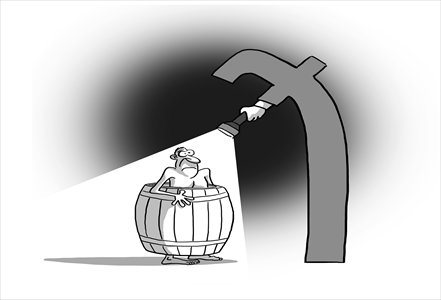Nosey employers turning social media into online PR mill

At the beginning of 2013, new laws came into force in California and Illinois that prohibit employers from demanding the passwords of the social media accounts of employees and job applicants.
This means that there are now six states with such a law, while federal legislation is stuck in congress. But on the other hand, users of social media still have to worry that HR departments are patrolling in their digital space. It's a bit like an adolescent boy reading an adult magazine in his own room - he always needs to be alert to the unannounced entrance of his parents.
Yet, HR departments are no parents. While parents provide you with food and shelter no matter what, HR departments would only provide you an opportunity to earn food if they like what they see on your Facebook page or Twitter account.
With employers increasingly relying on social media to dig out information about the real job applicant behind the professionally polished resumes, more and more people are regretting how wild they appear on Facebook.
Just ask Sharon Aceta. The eighth-grade math teacher in South Carolina was suspended after posting on Facebook a comment about President Barack Obama's reelection that was deemed offensive, or Lindsey Stone, an employee of a nonprofit organization in Massachusetts who was fired after posting a picture of herself making a vulgar gesture in the Arlington National Cemetery.
This is all creating a mini-industry in self-protection for those who take self-promotion to excess.
Some colleges have started to offer courses to seniors on how to polish their online image for better job opportunities. Job advisors also recommend cosmetic surgery on virtual selves.
Take this new year advice from Business Insider: "The new year is a great time to get on all the major social media networks or clean up your profiles. Get rid of any inappropriate pictures, status messages or tweets and replace them with information about your professional accomplishments."
A recent survey by Consumer Reports shows that 25 percent of Facebook users lie on their profiles, up from 10 percent two years ago, a trend the researchers attribute to rising awareness of privacy protection.
It is pretty horrific all round. Social media has been hijacked by recruiters and bosses who are turning any joy gained from the boundlessness of the Internet into a system of painstaking maintenance guided by rigid PR rules.
But before we blame the grinches and cry for our lost innocence, we may want to take a look at social media in its golden days - just a few years ago.
The employers may be unfair to base a job decision on social media profiles. If on the Internet nobody knows if you are a dog - say on a dating site - then how could someone know you are not reliable, honest and kind just because someone once took a picture of you drunk and half naked and stuck it on your or their Facebook wall?
When we post a picture, leave a comment, "like" or "dislike" this or that, who hasn't, consciously or not, been trying to create a particular image that may be somewhat different from reality? Who hasn't thought what the activity would make us look like to the audience - our hundreds or even thousands of "friends?"
Libby Page, a final-year journalism student at the London College of Fashion, posted a blog entry on the website of the Guardian in October 2012, pointing out how disappointing college life is in reality in contrast to the sparkling narrations on the students' Facebook pages. "Is your Facebook page a lie?" Page asked in the headline?
According to a recent survey by the Pew Research Center, 92 percent of Internet users aged 18 to 29 in the US use Facebook, the highest proportion of any age group. This happens to be the period in our life when we are most conscious of our own image and eager to have it approved by people around us.
Before the employers join in, we have already all been guilty of creating a self-censored PR mill online. We all know our Facebook life is not our real life but expect other people to believe it is. As reciprocation, we tend to believe the same of other people too.
With the participation of employers, we only have to switch our image design from a narcissus mode to a professional mode. Not a big change, indeed.
Does this mean that social media makes us more hypocritical or that social media is unfortunate to be born in this hypocritical era? That I don't know.
The author is a New York-based journalist. rong_xiaoqing@hotmail.com